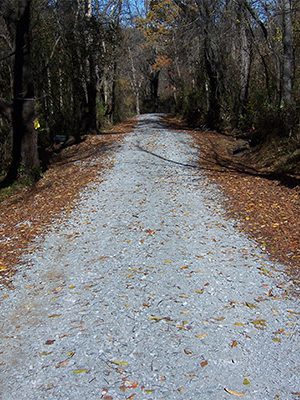
Nationwide, unpaved roads have been cut nearly in half since 1960. The nation, it seems, still believes that the road to paradise is paved with, well, pavement. Which brings me to consider what’s mainly wrong with society today?
I believe too many gravel roads have been paved. There’s not a problem in America today — crime, drugs, education, divorce, delinquency that couldn’t be remedied if we just had more gravel roads because they create character.
I was “raised” in a lone house on a gravel road in eastern Union Parish. That road, off Dean Church Rd, didn’t have a real name back then, just called “road to the gravel pit” or “road to Morgan Ridge.” It has since been widened and has a real name: “Dub McKinnie Road.” Says so right there on a real road sign. But it’s still a gravel road.
If you traveled past our house (down the lane, as we knew it), you dropped off into the Ouachita River bottoms; not another house for 17 miles. If you weren’t hunting, fishing or changing charts for the gas company, you had no business in the swamp.
People that grew up on gravel roads learn that life is just as rough as the roads they traveled. Washboard gravel roads would rattle your teeth, but the trip was worth it if you knew at the end of the road was home, a loving spouse, happy kids and a dog. Well, at least we had a dog, not sure how loving and happy everyone was. Did you ever wonder if the perfect worlds of the early TV families (Ozzie & Harriett, I Love Lucy, Leave it to Beaver) ever existed??
We wouldn’t have nearly the problems with our educational system if our kids got more exercise, walking a gravel road ¼ mile to catch the Joe Clel Miller driven school bus. We then rode five miles to Linville School. But we looked forward to school, so we could play with “other kids” and learned how to get along.
Criminals didn’t travel two miles down a gravel road to rob or rape, if they knew they’d be welcomed by three barking Catahoula hog dogs and a double barrel shotgun. And there were no drive-by shootings; the houses were at the end of the road.
I have even heard gravel roads used as an analogy of punishment. A country boss would make your life “more miserable than walking barefoot down a gravel road”.
Our values were better when our roads were worse! Motorists were more courteous. They would slow down when meeting vehicles or pedestrians. You didn’t tailgate by riding their bumper because the guy in front would choke you with dust and bust your windshield with rocks. Gravel roads taught patience.
Gravel roads made you plan ahead; you didn’t drive to the convenience store for the milk you needed, you walked to the barn and milked the cow. To get your mail, you walked to the main road. What if it rained and the gravel road got flooded or culvert got washed out? That was the best part. You skipped school, played in the woods, hunted with Daddy, had some quality time with your pet goat and learned how to “make stuff.”
Most paved roads lead to trouble; Gravel roads more likely lead to hunting, fishing or a swimming hole. At the end of a gravel road, we never locked our house or vehicle (singular) because we never considered break-ins, theft, or meanness. Everyone knew about the three dogs and a shotgun.
For those who ventured beyond the end of a gravel road, trouble waited. Amazing how many slick-tired cars and trucks would get stuck in the Ouachita River swamp. Since we were the last house on the road, they would walk out with that hang-dog look, recount their misery. Having the only Jeep in the area, we’d drive back down into the swamp and pull them out. We would always get thanks, a promise to never try that again, and sometimes a dollar. But, we always made a new friend…at the end of a gravel road
 fgazette.com Community news site for Union Parish Louisiana
fgazette.com Community news site for Union Parish Louisiana